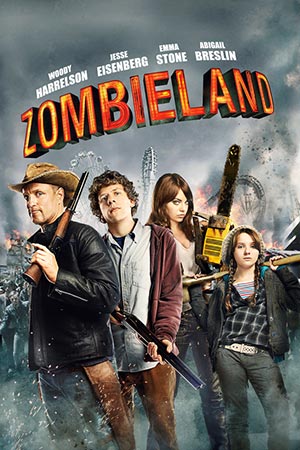
Barack Obama is our latest Nobel Laureate. The world (or at least that part of the world that thinks the Nobel prize has more credibility than the medal the Wizard pins on the cowardly lion’s chest) is abuzz with the news. Opinions vary. Moderate conservatives are cracking jokes. Immoderate conservatives are attributing it to affirmative action (do I smell a whiff of racism in Erick Erickson’s snide remarks?) And some conservatives even state reasons for their opinions. Yet the view from the left isn’t much different, as we see in the Salon and the Huffington Post. Even the Taliban has weighed in, pointing out the absurdity of awarding the Peace Prize to a man who has ordered an extra 21,000 troops to Afghanistan this year. [Note: most of these links no longer work.]
But my post isn’t about the 2009 Nobel Peace Prize. It’s about Zombieland, last week’s release from Sony Pictures which stars Woody Harrelson, Jesse Eisenberg, Emma Stone and Abigail Breslin. Zombieland is set in a post-apocalyptic America which is overrun by Zombies. We follow four survivors on a road trip as they pursue their separate dreams. Columbus (Eisenberg) is looking for family, or at least for a sense of acceptance. Tallahassee (Harrelson) wants to eat as many Twinkies as he can find before they reach their expiration date (presumably the people at Hostess can”t manufacture any more Twinkies because they”ve had their brains eaten). And the two sisters, Wichita (Stone) and Little Rock (Breslin) are headed for Pacific Playland, a California amusement park filled with fond childhood memories.
Before viewing the film, I had assumed that Zombieland was yet another in a growing catalogue of uniquely American paranoid alien invasion movies and video games. Film makers and game developers imagine a beseiged America as the last bastion of freedom that must defend itself against invading hordes of aliens who threaten to destroy a beautiful way of life. It’s a well-established genre. The aliens are thinly disguised stand-ins for whatever ethnic or national group seems most threatening at the time – Japan in WWII, Russia during the Cold War, now Islam, the Taliban, Mexicans. Hell, even us Canadians threaten the American way of life what with our same-sex marriage laws and compassionate approach to health care. Remakes like Invasion of the Body Snatchers, War of the Worlds and The Day the Earth Stood Still illustrate how easy it is to substitute one threat for another when paranoia is a cornerstone of a national culture. Others in the genre include The Blob (soon to be a remake), Predator (another installment coming next summer), and Independence Day. The Terminator and Matrix franchises also fit the mold because oppressive machines and computer programs can serve just as well as aliens. While many video games don’t bother to disguise the enemy (e.g. Call of Duty), others follow the rules of the genre. For example, in Crysis, American commandos have to deal with aliens who are getting a foothold in North Korea. And in Halo, a cybernetically enhanced human helps the world fight off the Covenant, “a theocratic alliance of alien races” (read Islam).
But Zombieland is different. My first clue that something was afoot (or a leg or a bit of brain) came when Tallahassee stopped to raid an abandoned Hostess truck for Twinkies. This is Woody Harrelson, the man who’s name has become synonymous with a fanatical devotion to Yoga and fresh vegetable juice. He couldn’t possibly eat a Twinkie onscreen unless it was really important that the world think about the meaning of Twinkies at some higher level. What is the zen of the Twinkie?
It all came together for me during a scene at a truck stop tourist shop, one of those tacky places crammed full of useless stuff at bargain prices. With a country overrun by Zombies, there are no social controls. The foursome can go wild. And so they trash the place. They smash all those pointless consumer goods with as much relish as they smash in the skulls of attacking Zombies. Aha! I say to myself. This isn’t like other paranoid films. This isn’t about defending the American way of life. This is about skewering the American way of life. Along the way, the film pokes fun at rednecks and big cars, gun culture, Hollywood celebrity (Bill Murray does a wonderful death scene), road movies, Ghostbusters, last stand Westerns, killer clowns, grocery stores, golf, H1N1, Mexican standoffs, geek-comes-of-age films, amusement parks, and post-apocalyptic nightmares.
You see, Zombie invasions are different. On the surface, they look like alien invasions, but they have a pathology all their own. Aliens come from some other place. It is the unknown which makes them frightening. But Zombies arise from within our midst. Any one of us could become a Zombie. All it takes is a little nibble. Zombiedom is a condition, a disease, and like all disease in literature and film, it taps into that centuries-old tradition that equates disease and moral failure. America is Zombieland. It has a disease. It loves Twinkies and guns and useless consumer goods.
But there’s a cure. As Columbus concludes at the end of the film, what matters are the relationships we forge with those we encounter in our daily living.
The leader of Zombieland has just been awarded the Nobel Peace Prize. The Nobel Committee cited “his extraordinary efforts to strengthen international diplomacy and cooperation between peoples.” Like all Americans, Obama is at risk of becoming a Zombie. Sadly, such was the fate of his predecessor. But Obama may yet save himself from this horrible condition. The Nobel Committee has sensed that Obama understands the lesson of Zombieland: the only way to effect meaningful change in the world is by forging durable relationships.